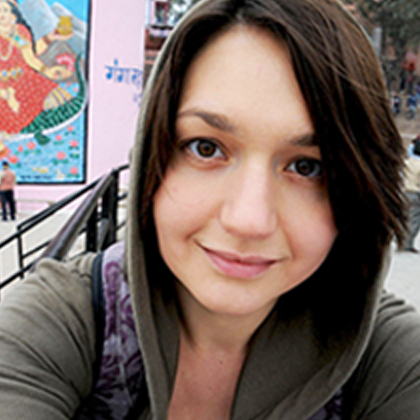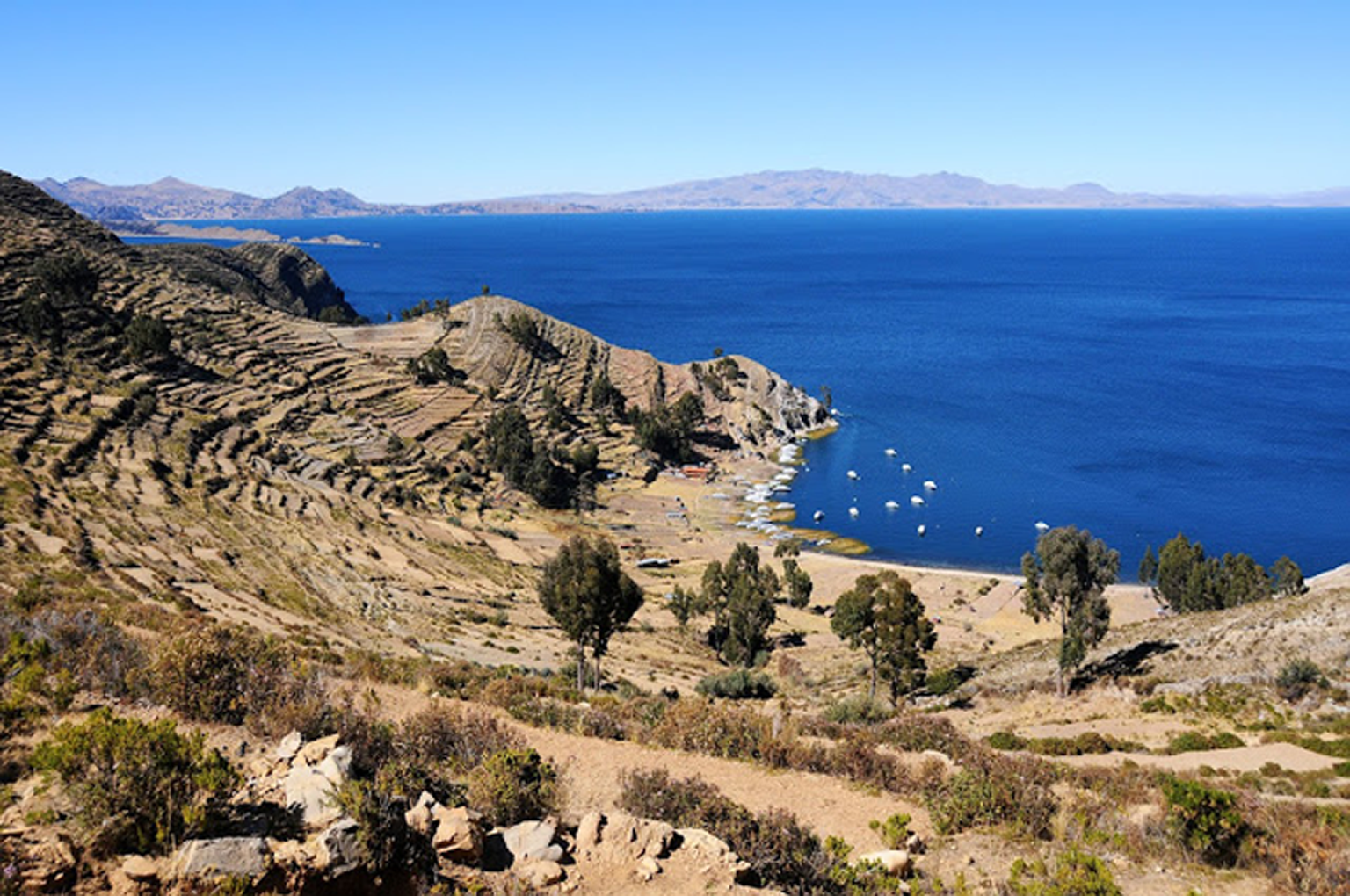- Posted by:
- anjci
- Under:
- Travel: South America
In the morning of my departure, I walked into La Torre Hotel’s breakfast room with certain uneasiness. Three of the people in the room would be my travel companions for the next four days. This was terrifying: I am not a confident group-tour traveller and generally find travelling with others hard. It took me some time to accept travelling with my husband – arguably the one person I can comfortably be around for long spells at a time – and I still prefer to travel alone whenever I can. Travelling with strangers definitely does not rank very high in my books (see my musings on why I love travelling alone).
I needn’t have worried, however. I was only minutes away from meeting some of the funniest and friendliest people I have ever encountered. They were a group of friends from Barcelona – a Frenchman, an American and an Italiana – all travelling together across South America from Rio, where two of the trio had volunteered at the Olympics. We got along immediately, which, given that we had to share a room for three nights and a jeep for four days, was extremely important – especially for me, as I can easily get anti-social when forced to share personal space with strangers. I even found hiking the gorgeous Torres del Paine earlier this year difficult for the overbearing number of hikers all squashed into small rooms together. Thankfully, the experience in Bolivia was different and possibly made me a slightly better individual for all the friendliness and laughter shared with my companions. But I digress!
Happy moment: basking in the sun on the shores of Laguna Verde
The decision to visit the Uyuni Salt Flat on a jeep tour from Tupiza rather than Uyuni was probably my best on the whole trip.
First, the Tupiza trips are 4 days and 3 nights long while the Uyuni trips are shorter at 3 days and 2 nights, meaning one sees more of the Western-inspired landscapes around Tupiza. Second, Uyuni jeeps are reportedly absolutely stuffed with travellers, fitting 6 people in an 8-seater car, while Tupiza companies top the number at 5 (I was also able to pay extra to end up in a jeep with only 3 other travellers). Third, since Tupiza travellers are heading in the opposite direction from the Uyuni crowds, the arrival times to some (not all) sights of interest are different. And, finally, Tupiza tours visit the Uyuni salt flat in the better light at sunrise while Uyuni tours get there during the day – as you can imagine, the resulting experience is very different.
While the Uyuni trips to Bolivia’s Altiplano make part of the continent’s rather infamous “gringo trail” and are offered by numerous companies, there are only a handful of Tupiza-based agencies. I opted for La Torre Tours (yes, the same name as my hotel) and would recommend them unreservedly. The guide, Jorge, was friendly and knowledgeable, and our sweet cook, Valentina, did her best to vary our meals with the limited choices she had (all our food supplies for four days had been pre-loaded on the jeep ahead of the departure).
And the trip itself? I struggle to put into words the unearthly beauty of the landscapes of the Bolivian Altiplano. Call me lazy, but I will guide you through my journey in fewer words and more photos. Consider it a photo journal: there are plenty of blog posts dedicated to popular tours in Bolivia everywhere on the web, but one could never get enough photos to tickle their imagination. Enjoy!
TUPIZA TO UYUNI: DAY AWANAPAMPA, PUEBLO FANTASMA, QUETENA CHICO
The first day took us from Tupiza to the viewing point for a large canyon just outside town, Quebrada de Palala. We continued to Awanapampa, a valley swarming with grazing llamas, and on to the small village of Cerrillos with postcard-pretty adobe houses. We then reached the eerily abandoned former mining village, aptly named Pueblo Fantasma, or literally “ghost village”. Finally, after passing through numerous stunning alpine landscapes, we arrived to a small village of Quetena Chico for the night.
Watching a llama graze in Awanapampa not long after we left Tupiza
Sleepy village of Cerrillos and its adobe (earth material) buildings
Approaching Pueblo Fantasma through colourful landscapes
Frozen stream crosses the road
Alpine lake near Quetena Chico village
This rabbit-like creature called “viscacha” is actually of the chinchilla family
Pueblo Fantasma (literally “ghost village”, also jokingly known as “poor man’s Machu Picchu”) is an abandoned mining village
Quetena Chico village was our stop for the first night
TUPIZA TO UYUNI: DAY 2 ~ DESIERTO DE DALI, LAGUNA VERDE, SOL DE MAÑANA
The morning started with a frustratingly long argument between Jorge and the villagers, who blocked the road and insisted we pay extra to pass – fairly illegal by all standards, but we had no choice but to pay in the end. We were then off to Laguna Kollpa, a lake with massive borax deposits which the locals use as detergent, and Desierto de Dali, a desert whose shapes and colours resemble Dali’s paintings. We had lunch on the shores of the impossibly turquoise Laguna Verde and enjoyed a soak in the thermal springs nearby (which came in especially handy for the lack of showers in that night’s accommodation), before continuing to Sol de Mañana geothermal field. The highlight of the day was our final stop: Laguna Colorada, an orange coloured lake dotted with thousands of flamingos. We spent the night in the Villamar village nearby.
More stunning landscapes presented themselves on the way to Laguna Kollpa
On the shores of the surreal Laguna Kollpa
Borax deposits (yes, it isn’t ice!) in Laguna Kollpa are used by locals as a detergent
Landscape on the way from Laguna Kollpa to Laguna Verde
Shapes and colours of Desierto de Dali (“Dali Desert”), so named for its resemblance with Dali’s surreal paintings
Culpeo (Lycalopex culpaeus), also known as Andean fox, is South America’s second largest native canid
Arsenic and other minerals in Laguna Verde (“Green Lake”) define the lake’s unusual colour; the volcano in the backdrop is called Licancabur and is shared between Bolivia and Chile
Stunning colours near Desierto de Dali and Laguna Verde
Lake best known for its proximity to the “aguas termales” (“thermal springs”) complex, affectionately known among the Bolivians as “gringo sopa” (literally “gringo soup”!)
More views near the “aguas termales” while the other gringos are soaking up the heat
Despite a common misconception, Sol de Mañana (“morning sun”) complex in the Bolivian Altiplano does not contain geysers and is a field of geothermal sulphur springs
These steaming mud lakes in Sol de Mañana are wells in an artificially created geothermal field
Lookout to Laguna Colorada (“Red Lagoon”) towards the end of our second day on the road
Laguna Colorada is full of James’s flamingos whose pink colour contrasts with the lake’s white borax deposits
Laguna Colorada is so named for its reddish colour, the result of the lake’s high content of red sediments and certain algae
Late afternoon colours near Villamar, our stop for the second night
TUPIZA TO UYUNI: DAY 3 ~ ITALIA PERDIDA, LAGUNA NEGRA, CHUVICA
Today was less about lakes and more about interesting rocks. We visited three fascinating rock formations, all with pretty cool names: Copa del Mundo, Camello and Italia Perdida, before taking a walk around Laguna Negra (which, surprisingly, did not look black). We then admired a dizzying look into the deep Anaconda canyon and listened to our own heartbeat in the virtually entirely abandoned village of Julaca. After parking our backpacks in Chuvica village for the night, we ended the day watching a stunning sunset on the corner of Uyuni Salt Flat – our first glimpse of this stunning landmark.
A llama graciously agreeing to look into the camera near the “Italia Perdida” rock complex
The “Italia Perdida” (“Lost Italy”) rock formation is reportedly so named after an Italian traveller who went missing in the area (though other interpretations of the name’s origins abound!)
Barren landscapes en route our next stop, Laguna Negra
Laguna Negra (“Black Lake”) did not actually look black at all
Gravity-defying boulders on the craggy rocks surrounding Laguna Negra
The “Anaconda” canyon gets its nickname from the river’s meandering shape
Llamas grazing in peace in stunning backdrop, near the Julaca village
These railway tracks in the largely abandoned Julaca village lead all the way from Uyuni to Chile
Despite people still living in the Julaca village, it was eerily quiet
Capturing the sunset in the Uyuni Salt Flat with the 50mm lens, from lying flat on my stomach
Salar de Uyuni (“Uyuni Salt Flat”) covers 10 square km and is the world’s largest salt flat
TUPIZA TO UYUNI: DAY 4 ~ ISLA INCAHUASI, COLCHANI, UYUNI
The last day of our trip started at 5am as we drove off into sheer darkness to watch the sun rise over the Uyuni Salt Flat from Isla Incahuasi. I was certainly looking forward to breakfast at the foot of the Isla when the sun eventually did rise! We took hundreds of hilarious photos (“fotos locos”, as they are affectionately known here) playing with odd perspective in the salt flat. The day continued with lazy visits to Hotel de Sal and “Ojos de Sal” (outlets for subterranean rivers flowing under the Uyuni Salt Flat). We made a souvenir stop at Colchani village and ended the tour in Uyuni town around 2pm.
Freezing sunrise as viewed from Isla Incahuasi (“Inca House Island”) in the Uyuni Salt Flat
Isla Incahuasi is the top of a massive ancient volcano, which was submerged many years ago
Gigantic cacti are Isla Incahuasi’s best known inhabitants
The cacti are positively photogenic in the soft morning light
Uyuni Salt Flat’s iconic sheet of endless hexagonal tiles is a natural phenomenon
Mandatory “foto loco” in the Salar #1: Matt gives Hugo a kiss of life (Hugo is unimpressed)
Mandatory “foto loco” in the Salar #2: The “Quatro Llamas” (as we nicknamed our little foursome) jumps for joy
Mandatory “foto loco” in the Salar #3: I shrink Matt and Hugo in size and make them pose on my hands
Before I forget, Bolivia’s iconic woollen jumpers in Colchani
Finally the 4-day journey is up: arriving to Uyuni’s best known landmark, the central clocktower
After saying goodbye to Jorge and Valentina, my companions went off to have long showers in their hotel. Impossibly jealous, I instead waited for my jeep transfer to San Pedro de Atacama in Chile. Another shower-less night in the middle of the Bolivian Altiplano was not something I was particularly excited about. My beloved Chile was only one night’s sleep away though… but that is a different story altogether.












Juan Jose Iglesias says:
February 7, 2020 at 4:44 am
Your tale of the trip and pictures are amazing. Perhaps next time a little bit of georeferenced data will be fine so people could locate the exact position were the pictures were taken. That could help other travelers to find the same spot.
Otherwise inmacute your blog. Congrats
anjci says:
February 8, 2020 at 1:36 pm
Hey Juan Jose – thank you so much for this recommendation and your kind words. Happy travels! ?
Shane Dias says:
October 3, 2019 at 11:25 am
Hi, Very interesting reading, well done. The tour looks amazing, your photos are simply stunning! I have two questions: What sort of lens did you use for your landscape shots? I am doing this tour with the same company in two weeks time. YOU mention you did not have a shower for the duration, could you not get warm water? I am also doing the transfer to SPdeA the same day as you. Need to figure out whether I can pay extra for a private room.
anjci says:
November 28, 2019 at 3:59 pm
Hey Shane, it appears I haven’t been receiving comment notifications from WordPress for a while. Apologies! Not much use now, but here are my answers:
1. Lens – I didn’t have any of my fancy lenses yet at the time of the Bolivia trip, so it would have to have been Nikkor 18-200mm.
2. Showers – I actually did take a shower for which I had to pay, on Day 3. It was possible to pay for hot showers in every overnight accommodation, I think, but I was saving a little. On Day 2 you visit a hot spring anyway.
Bolivian adventures: La Paz, Titicaca and Sucre - Anjci All Over says:
August 8, 2017 at 7:44 pm
[…] Part III: BOLIVIAN ADVENTURES: FROM TUPIZA TO UYUNI IN 4 DAYS […]
Bolivian adventures: Potosí and Tupiza - Anjci All Over says:
August 7, 2017 at 10:15 am
[…] Part III: Bolivian adventures: From Tupiza to Uyuni in 4 days […]
Comments are closed.